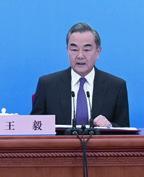RELATIONS AND RESPONSIBILITIES
2021-04-01

China-U.S.
As two countries with different social systems, China and the U.S. naturally have differences and disagreements. What matters most is to manage them effectively through candid communication to prevent strategic miscalculation and avoid conflict and confrontation.
China and the U.S. are the worlds two largest economies. As our interests converge, there may be a competitive element in our relations. This is normal. What matters is that the two sides advocate healthy competition on a fair and just basis for self-improvement and mutual enhancement, rather than indulge in finger-pointing or zerosum competition.
More importantly, in the interest of the two countries and the whole world, cooperation should be the main goal for both China and the U.S. The list of areas where the two countries can and should cooperate is very clear, including COVID-19 response, economic recovery and climate change. We are open to exploring and deepening cooperation with the U.S. and hope it will move in the same direction and remove its unreasonable restrictions on bilateral cooperation as early as possible, not create new obstacles.
China-Russia
This year marks the 20th anniversary of the Treaty of GoodNeighborliness and Friendly Cooperation Between China and Russia. Our two countries have agreed to renew the treaty and make it more relevant in the new era. This is a milestone in China-Russia relations and a new starting point for us.
The two sides will carry forward the spirit of everlasting friendship and win-win cooperation embodied by the treaty, keep up the momentum, generate new dynamism and expand, broaden and deepen the China-Russia comprehensive strategic partnership of coordination for a new era.
China-Japan
On any issue that arises in bilateral interactions, China and Japan can always engage in dialogue and communication to enhance understanding and build trust. I hope that Japanese society will embrace a more objective and rational perception of China so as to solidify public support for long-term steady progress in China-Japan relations.
China-ASEAN
The 30th anniversary of China-ASEAN dialogue relations [in 2021] provides a new starting point, from which China is ready to work with ASEAN to build an even closer community with a shared future, and open up another 30 years of even greater cooperation.
China will scale up support to ASEANs pandemic response. Going forward, we will continue to prioritize the needs of ASEAN countries, deepen cooperation with ASEAN for mutual benefit and step up strategic coordination.
China-Europe
China and Europe are two important players in this multipolar world. The relationship is equal and open, not targeting any third party or controlled by anyone else. China welcomes an EU that enjoys strengthened strategic autonomy, upholds multilateralism and commits itself to coordination and cooperation between major countries.
We stand ready to work with the EU to jointly tackle global challenges, boost international efforts on pandemic response, economic recovery and climate change, and add more stability to international relations.
China-Africa
We celebrated the 20th anniversary of the Forum on China-Africa Cooperation (FOCAC) last year. The FOCAC meeting in Senegal this year will serve as another opportunity for advancing China-Africa cooperation.
We will support Africas efforts to defeat the virus and strengthen public health governance; to accelerate industrialization and build up capacity for self-generated development; to speed up African integration and embrace the trend of economic globalization; and to find political solutions to hotspot issues and maintain peace and stability on the continent.
We will work with Africa to pursue high-quality Belt and Road cooperation and build an even stronger community with a shared future to drive Africas development and vitalization.
China-LAC
Last year marked the 60th anniversary of the establishment of diplomatic ties between China and Latin America and the Caribbean (LAC). Our economic and trade cooperation continued to bear fruit in the past year. Two-way trade has exceeded $300 billion for three years in a row. Exports from the region to China expanded despite the disruptions of COVID-19.
China will continue to strengthen friendship and cooperation with our Latin American and Caribbean friends.
China-India
China and India are friends and partners, not threats or rivals. The two sides need to help each other succeed instead of undercutting each other; we should intensify cooperation instead of harboring suspicion about each other.
The boundary dispute, an issue left from history, is not the whole story of the relationship. It is important that the two sides manage the dispute properly and at the same time, expand and enhance cooperation to create enabling conditions for settling the issue.
China-Arab States
Trade between China and Arab states has reached$240 billion and China remains their largest trading partner. Key Belt and Road cooperation projects are being resumed in an orderly way. Cooperation in high and new technologies such as 5G, artificial intelligence, aviation and aerospace is thriving. SinoArab practical cooperation has reached a new height.
The UN
Given the profound evolution of the international situation, the international community is expecting the UN to keep pace with the times and improve itself through reform.
In our view, no matter how the situation may evolve and how the reform may proceed, the following principles must be preserved: upholding the purposes and principles of the UN Charter; preserving the central role of the UN in the international system; and keeping to the basic rule of equal-footed consultation at the UN.

Global Governance
Multilateralism remains Chinas firm commitment. It has never wavered despite the changing times or circumstances. The way to address the various challenges in our world is for countries to uphold true multilateralism. China believes that true multilateralism means observing the purposes and principles of the UN Charter, upholding the UN-centered international system and promoting democracy in international relations.
Building small circles in the name of multilateralism is in fact“group politics.” Multilateralism with ones own interests taking precedence is still unilateral thinking.“Selective multilateralism” is not the right choice.
COVID-19 Response
China was among the first to pledge that its vaccines, when available, will be made a global public good. It has worked in real earnest to improve vaccine accessibility and affordability in other developing countries. The safety and effectiveness of Chinese vaccines are earning recognition across the world.
We have joined [global vaccine alliance] COVAX, undertaking to initially provide 10 million doses for emergency use in other developing countries. So far, China has donated or is donating vaccines to 69 developing countries in urgent need, and is exporting vaccines to 43 countries.
China opposes vaccine nationalism. We reject any vaccine divide or attempt to politicize vaccine cooperation. We hope all capable countries will do what they can to provide vaccines to the countries in need, especially developing countries, so that people all over the world have access to affordable vaccines.
South China Sea
China and ASEAN countries need to continue to “walk on two legs”on the South China Sea issue.
First, remove distractions and press ahead with consultations on the Code of Conduct in the South China Sea, and work for an early conclusion of a set of regional rules that are more substantive and effective, consistent with international law and serve the needs of all parties.
Second, continue with full and effective implementation of the Declaration on the Conduct of Parties in the South China Sea in order to build consensus, enhance mutual trust, advance cooperation and maintain overall stability in the South China Sea. BR
